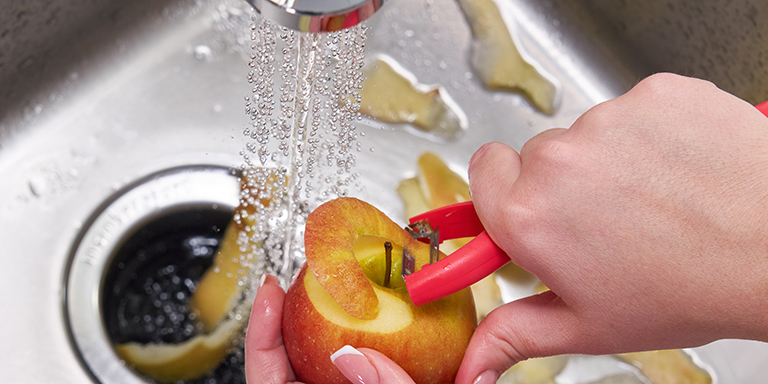Plumbing issues are a common headache for homeowners, yet many of us still fall for age-old myths that can lead to costly mistakes. Whether it’s flushing the wrong items down the toilet or using lemon peels to freshen up the garbage disposal, misconceptions about plumbing are widespread. Understanding these myths is crucial for maintaining a healthy plumbing system and avoiding unnecessary repairs. This blog post aims to debunk some common plumbing myths, offering homeowners accurate information to protect their homes and wallets.
Myth 1) Lemon Peels are a Great Way to Clean Garbage Disposals
Lemons are often associated with cleanliness and freshness, so it’s no surprise that many people believe lemon peels are a perfect cleaning agent for garbage disposals. While the scent of lemon can temporarily mask odors, the peels themselves can actually cause harm. The fibrous nature of lemon peels can get tangled in the disposal blades, causing them to jam. Over time, this can lead to wear and tear on the motor, reducing the lifespan of your disposal unit.
Instead of using lemon peels, consider safer alternatives like baking soda and vinegar, which can clean and deodorize without causing damage. Pouring these down the drain can help break up grease and grime, keeping your disposal running smoothly. Remember, maintenance is key to extending the life of your garbage disposal.
Myth 2) Running Water While Using the Garbage Disposal Helps It Work Better
Many homeowners believe that running water while operating the garbage disposal will help it function more efficiently and prevent clogs. However, this isn’t entirely true. While water can assist in flushing down small bits of food, it won’t dissolve larger chunks that can eventually lead to blockages.
Running water also won’t help if you’re disposing of items that shouldn’t go down the drain in the first place, like grease, coffee grounds, or fibrous vegetables. These materials can build up over time, leading to significant clogs that even running water can’t clear.
To keep your garbage disposal in optimal condition, always scrape food scraps into the trash or compost bin before rinsing plates in the sink. Use cold water to rinse waste; hot water can liquefy fats, which then solidify further down the pipes, causing clogs.
Myth 3) You Can Flush Anything Down the Toilet if The Packaging Says “Flushable”
The packaging of many household items, like wet wipes and feminine hygiene products, often claim to be “flushable.” However, these items can cause significant damage to your plumbing system. Unlike toilet paper, which is designed to break down quickly in water, these products do not disintegrate as easily. Instead, they can clump together and form large blockages in your pipes.
To avoid clogs and potential backups, it’s best to stick with only flushing human waste and toilet paper down the toilet. Keep a small bin next to the toilet for disposing of other items that may seem flushable but aren’t.
Myth 4) All Dripping Faucets are Minor Issues
A dripping faucet may seem like a minor inconvenience, but it can indicate a more serious problem. Over time, leaks can worsen, leading to higher water bills and potential water damage. A single drip per second can waste over 3,000 gallons of water annually, adding unnecessary costs to your utility bills.
Ignoring a dripping faucet can also lead to more significant issues within your plumbing system. The constant drip can wear away at the faucet’s components, leading to further leaks and even structural damage if left unchecked. It’s crucial to address these leaks promptly to avoid more extensive repairs down the line.
If you notice a dripping faucet, it’s best to investigate and resolve the issue as soon as possible. Whether it’s a simple fix, such as replacing a washer, or a more complex problem requiring professional attention, addressing a dripping faucet promptly can save you time and money in the long run.
Myth 5) You Don’t Need to Worry About Frozen Pipes if You Live in a Mild Climate
Many homeowners believe that frozen pipes are only a concern in colder climates. However, even in mild climates, sudden temperature drops can cause pipes to freeze and burst. This can lead to significant water damage and costly repairs, regardless of where you live.
Pipes located in unheated areas, such as basements, attics, and garages, are particularly vulnerable to freezing. To prevent this, consider insulating these pipes or using pipe sleeves. Additionally, during cold spells, allow faucets to drip slightly to keep water moving through the pipes, reducing the risk of freezing.
It’s also essential to disconnect garden hoses and shut off outdoor faucets before winter. Water left in these hoses can freeze and expand, leading to cracks in the pipes and potential water damage inside your home.
Regardless of your climate, taking precautions against frozen pipes can save you from dealing with the aftermath of a burst pipe. Insulating vulnerable pipes and taking preventative measures during cold weather can help you avoid costly repairs.
Bodenheimer Plumbing Services: Your Trusted Partner in Plumbing Maintenance
At Bodenheimer Plumbing Services, we understand the importance of proper plumbing maintenance and debunking common myths that can lead to costly repairs. Our team of experienced professionals is dedicated to providing top-quality services, from drain cleaning and garbage disposal maintenance to addressing leaks and frozen pipes.
Don’t let plumbing myths cost you time, money, and stress. Contact Bodenheimer Plumbing Services today for all your plumbing needs and trust us to keep your home’s plumbing running smoothly. Remember, prevention is key to maintaining a healthy and functional plumbing system. So don’t hesitate to reach out for our expert help when needed!


